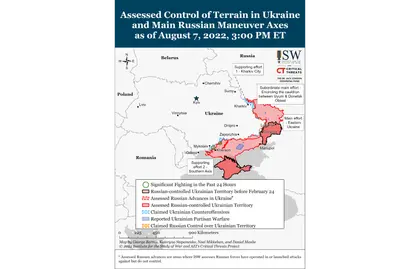Key Takeaways
- Russian military leadership continues to experience major turnover, which is likely impacting Russian command and control efforts in Ukraine.
- Russian forces conducted limited ground attacks southwest and southeast of Izyum, east of Siversk, and to the east and south of Bakhmut.
- Russian forces have likely made incremental gains in settlements on the northwestern and southwestern outskirts of Donetsk City and continued efforts to break Ukrainian defensive lines along the Avdiivka-Donetsk City line of contact.
- Russian forces unsuccessfully attempted to advance east of Mykolaiv City on August 7.
- Russian forces are forming a new 72nd Separate Motorized Rifle Brigade in Orenburg Oblast as part of the 3rd Army Corps.
Russian occupation officials may be accelerating their preparations for illegitimate pseudo-referenda on the Russian annexation of occupied Ukrainian territory.
JOIN US ON TELEGRAM
Follow our coverage of the war on the @Kyivpost_official.
The Ukrainian Mayor of Melitopol, Zaporizhia Oblast, Ivan Fedorov, reported on August 7 that resistance among Ukrainian residents has forced Russian authorities to “constantly” change their plans for a referendum. Fedorov claimed that occupation authorities had planned a single day of voting but are now considering seven days of “voting from home” in which armed Russian military personnel will go house to house and “interview” Melitopol residents. Fedorov claimed that only about 10% of the civilians remaining in Melitopol support Russia’s occupation and warned that Russian soldiers will threaten to shoot residents who do not vote for annexation.
Ukrainian Kherson Administration Advisor Sergey Khlan noted that occupation authorities have not fully set conditions for a referendum as of August 7 but are accelerating their preparation after a three-week pause in preparations, which Khlan attributed to Ukrainian HIMARS attacks on Russian occupation logistics. Occupation authorities could also alter the timeline of their sham referenda in response to changing realities on the ground, including a Ukrainian counteroffensive. Khlan reported that the preliminary referendum date remains September 11.

EU Transfers €1.5 Bln Raised From Russian Assets for Ukraine
By removing in-person voting options and transitioning to house-to-house surveys, Russian occupation authorities are increasing their opportunities to directly intimidate Ukrainian civilians. This effort is unnecessary to rig the vote to the outcome the Kremlin desires but does make any independent oversight of the vote nearly impossible. Occupation authorities may also turn these “surveys” into intelligence gathering operations to weed out Ukrainian opposition in occupied areas. Removing in-person polling stations removes many requirements for bureaucrats to staff those locations. Russian forces have struggled to recruit people into these positions from occupied populations. In-home voting also limits opportunities for partisan attacks on those locations.
The Kremlin may order different types of voting in different occupied locations depending on perceived local support, perceived risk of partisan attacks, and bureaucratic capacity. For example, the Ukrainian head of the Luhansk Oblast Civil-Military Administration, Serhiy Haidai, reported on August 7 that Russian occupation authorities in Luhansk Oblast have identified venues to host their sham annexation referendum in person.
Haidai reported that Russian occupation authorities are actively campaigning for annexation by distributing propagandist newspapers and tying the provision of humanitarian aid including food, water, and construction materials to participate in the pseudo-referendum. Haidai said that the practice amounts to blackmail: “we [the Russians] will help you [Ukrainian civilians] meet your basic needs, while you go to the ‘referendum.’ Otherwise, die, and we will fabricate the result without you.” Russia has occupied parts of Luhansk Oblast since 2014 and likely has greater capacity to mobilize collaborators to administer polling stations than in newly occupied areas. ISW reported on August 3 that occupation authorities in Donetsk Oblast may allow in-person and online participation, providing multiple levers for Russian officials to alter the results.
The Iranian Space Agency (ISA) denied reports on August 7 that Russia will use an Iranian satellite over Ukraine for several months after Russia launches the satellite on behalf of Iran.
State-run Iranian news outlet IRNA cited an ISA statement on August 7 asserting that the satellite will be controlled by and from Iran “from day one, immediately upon launch.” The ISA emphasized that “No other country will have access to such information, and rumors about satellite imagery being deployed in service of another country’s military objectives are untrue.”
The Washington Post cited two Western intelligence officials’ claims on August 4 that Russia would retain control of the satellite after launch to surveil Ukraine and would cede control of the satellite to Iran at an indefinite future date. ISW reported on August 3 that the Kremlin is likely continuing efforts to leverage its relationship with Tehran in order to receive drones for use in Ukraine. ISW cannot independently confirm which state will control the satellite, which Russia plans to launch from Kazakhstan on August 9.
The UK Ministry of Defense (UK MoD) confirmed ISW’s previous assessments that Russian military leadership has experienced major turn-overs due to Russian military failures in Ukraine.
UK MoD reported that at least six Russian commanders have likely been dismissed from their posts since the beginning of the war in February, potentially including Eastern Military District (EMD) commander Colonel General Aleksandr Chayko and Western Military District (WMD) commander Colonel General Aleksandr Zhuravlev.
UK MoD additionally stated that Army General Aleksandr Dvornikov has been removed from overall theater command of Ukraine and that Army General Sergey Surovikin has taken over the “Southern Grouping” of forces in Ukraine. UK MoD concluded that the lack of consistency in the Russian command structure and continued losses to military leadership on the battlefield are complicating command and control and the overall effectiveness of operations in Ukraine.
ISW has previously reported on changes to Russian military command and continues to track the ramifications of these changes on Russian offensive capabilities.
Authors: Kateryna Stepanenko, Katherine Lawlor, Karolina Hird, George Barros, and Frederick W. Kagan.
Read the full report here.
You can also highlight the text and press Ctrl + Enter






